List of wars involving the United States
The accessibility of this article is in question. The specific issue is: has over 100 files MediaWiki:Limit number of images in a page. Relevant discussion may be found on the talk page. |
This is a list of military conflicts, that United States has been involved in. There are currently 123 military conflicts on this list, 5 of which are ongoing.[citation needed] These include major conflicts like the American Revolutionary War, the War of 1812, the Mexican–American War, the American Civil War, the Spanish-American War, World War I, World War II and the Gulf War. It also includes US involvement in widespread periods of conflict like the Indian Wars, the Cold War (including the Korean War and the Vietnam War), and the War on Terror (including the Iraq War, the War in Afghanistan, and others).
Five military engagements encompassing four wars, all of which are interventions, currently involve the US: the Israel–Hamas War, Yemeni Civil War, the Somali Civil War, and the Syrian Civil War.
- USA victory
- Another result *
- USA defeat
- Ongoing conflict
*e.g. a treaty or peace without a clear result, status quo ante bellum, result of civil or internal conflict, result unknown or indecisive, inconclusive
18th-century wars
| Conflict | Allies | Opponent(s) | Result for the United States and its Allies | Presidents of the United States |
|---|---|---|---|---|
| American Revolutionary War (1775–1783) Location: Eastern and Southern North America the Atlantic  |
Watauga Association |
US-allied victory - The American Revolution started as a civil war within the British Empire.[nb 1] It became a larger international war in 1778 once France joined.[nb 2]
|
President of the Continental Congress in American Revolutionary War: | |
| Cherokee–American wars (1776–1795) Part of the American Indian Wars Location: Old Southwest  |
Choctaw |
Cherokee
Supported by:
|
US-allied victory | President of the Continental Congress in Cherokee–American wars:
Presidents of the United States: |
| Northwest Indian War (1785–1793) Part of the American Indian Wars Location: Northwest Territory 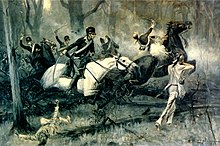 |
Chickasaw Choctaw |
Western Confederacy
List
|
US-allied victory
|
George Washington |
| American–Algerian War (1785–1795) Location: Mediterranean Sea and Atlantic Ocean 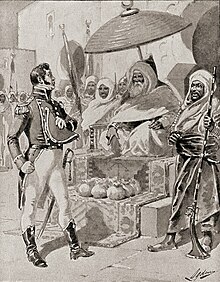 |
Algerian victory
|
George Washington | ||
| Quasi-War (1798–1800) Location: Atlantic Ocean, the Caribbean, the Indian Ocean and the Mediterranean  |
Co-belligerent: |
Convention of 1800
|
John Adams |
19th-century wars
| Conflict | Allies | Opponent(s) | Result for the United States and its Allies | Presidents of the United States |
|---|---|---|---|---|
| First Barbary War (1801–1805) Part of the Barbary Wars Location: Mediterranean Sea off the coast of Tripoli  |
US-allied victory | Thomas Jefferson | ||
| Tecumseh's War (1810–1813) Part of the American Indian Wars and the War of 1812 Location: Northwest River Ohio  |
Tecumseh's Confederacy
List |
US victory | James Madison | |
| War of 1812 (1812–1815) Location: Eastern and Central North America  |
Choctaw Nation Cherokee Nation Creek Allies |
List |
Inconclusive/Other Result
| |
| Creek War (1813–1814) Part of the American Indian Wars and the War of 1812 Location: Southern United States  |
Lower Creeks Cherokee Nation Choctaw Nation |
Red Stick Creek
Supported by: |
US-allied victory | |
| Nuku Hiva Campaign (1813–1814) Part of the War of 1812  |
Tai Pi
Happah (October 1813) Te I'i (May 1814) |
US tactical victory
Polynesian strategic victory
| ||
| Second Barbary War (1815) Part of the Barbary Wars Location: Mediterranean Sea and the Barbary States  |
US victory | |||
| First Seminole War (1817–1818) Part of the Seminole Wars and the American Indian Wars Location: Pensacola, Spanish Florida  |
Seminole
|
US victory
|
James Monroe | |
| Arikara War (1823) Part of the American Indian Wars Location: Missouri River 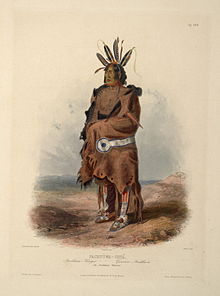 |
Arikara | Inconclusive/Other Result
|
||
| Aegean Sea anti-piracy operations of the United States (1825-1828) Part of the Greek War of Independence
 |
US Victory
|
John Quincy Adams | ||
| Winnebago War (1827) Part of the American Indian Wars Location: Illinois and Michigan Territory |
Choctaw Nation |
Prairie La Crosse Ho-Chunks with a few allies |
US-allied victory
| |
| First Sumatran Expedition (1832) Part of the Sumatran expeditions  |
Chiefdom of Kuala Batee | US Victory | Andrew Jackson | |
| Black Hawk War (1832) Part of the American Indian Wars Location: Illinois and Michigan Territory  |
Ho-Chunk Menominee Dakota Potawatomi |
Black Hawk's British Band Ho-Chunk and Potawatomi allies |
US-allied victory
| |
| Second Seminole War (1835–1842) Part of the Seminole Wars and the American Indian Wars Location: Florida, United States  |
Seminole | US victory
|
Andrew Jackson (March 4, 1829 – March 4, 1837)
Martin Van Buren (March 4, 1837 – March 4, 1841) William Henry Harrison (March 4, 1841 – April 4, 1841) John Tyler (April 4, 1841 –March 4, 1845) | |
| Texas Comanche Wars (1836–1875) Part of the Texas–Indian wars and the American Indian Wars Location: South-central United States (Texas, Oklahoma, New Mexico, Kansas, Colorado) and northern Mexico  |
Comanche | US victory | Andrew Jackson (March 4, 1829 – March 4, 1837)
Martin Van Buren (March 4, 1837 – March 4, 1841) William Henry Harrison (March 4, 1841 – April 4, 1841) John Tyler (April 4, 1841 –March 4, 1845) James K. Polk (March 4, 1845 – March 4, 1849) Zachary Taylor (March 4, 1849 – July 9, 1850) Millard Fillmore (July 9, 1850 – March 4, 1853) Franklin Pierce (March 4, 1853 – March 4, 1857) James Buchanan (March 4, 1857 – March 4, 1861) Abraham Lincoln (March 4, 1861 – April 15, 1865) Andrew Johnson (April 15, 1865 – March 4, 1869) Ulysses S. Grant (March 4, 1869 – March 4, 1877) | |
| Second Sumatran Expedition (1838) Part of the Sumatran expeditions  |
Chiefdom of Kuala Batee
Chiefdom of Muckie |
US Victory
|
Martin Van Buren | |
| Battle of Drummond's Island
(1841) 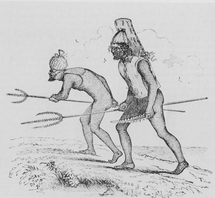 |
Micronesian Natives | US victory
|
John Tyler | |
| Ivory Coast Expedition (1842) Part of the African Slave Trade Patrol and the Blockade of Africa  |
Bereby | US Victory
| ||
| Capture of Monterey (1842) Location: Mexico (Modern day California)  |
Inconclusive/Other Result
| |||
| Mexican–American War (1846–1848) Location: Texas, New Mexico, California and Mexico  |
US-allied victory
|
James K. Polk | ||
| Cayuse War (1847–1855) Part of the American Indian Wars Location: Oregon 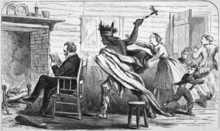 |
Cayuse | US victory
|
James K. Polk (March 4, 1845 – March 4, 1849)
Zachary Taylor (March 4, 1849 – July 9, 1850) Millard Fillmore (July 9, 1850 – March 4, 1853) Franklin Pierce (March 4, 1853 – March 4, 1857) | |
| Apache Wars (1849–1924) Part of the Texas–Indian wars and the American Indian Wars Location: Southwestern United States  |
Apache Ute Yavapai |
US victory
|
James K. Polk (March 4, 1845 – March 4, 1849)
Zachary Taylor (March 4, 1849 – July 9, 1850) Millard Fillmore (July 9, 1850 – March 4, 1853) Franklin Pierce (March 4, 1853 – March 4, 1857) James Buchanan (March 4, 1857 – March 4, 1861) Abraham Lincoln (March 4, 1861 – April 15, 1865) Andrew Johnson (April 15, 1865 – March 4, 1869) Ulysses S. Grant (March 4, 1869 – March 4, 1877) Rutherford B. Hayes (March 4, 1877 – March 4, 1881) James A. Garfield (March 4, 1881 – September 19, 1881) Chester A. Arthur (September 19, 1881 – March 4, 1885) Grover Cleveland (March 4, 1885 – March 4, 1889) Benjamin Harrison (March 4, 1889 – March 4, 1893) Grover Cleveland (March 4, 1893 – March 4, 1897) William McKinley (March 4, 1897 – September 14, 1901) Theodore Roosevelt (September 14, 1901 – March 4, 1909) William Howard Taft (March 4, 1909 – March 4, 1913) Woodrow Wilson (March 4, 1913 – March 4, 1921) Warren G. Harding (March 4, 1921 – August 2, 1923) Calvin Coolidge (August 2, 1923 – March 4, 1929) | |
| Navajo Wars (1849–1866) Part of the American Indian Wars Location: New Mexico 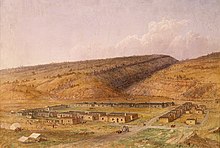 |
Navajo Nation | US victory
|
James K. Polk (March 4, 1845 – March 4, 1849)
Zachary Taylor (March 4, 1849 – July 9, 1850) Millard Fillmore (July 9, 1850 – March 4, 1853) Franklin Pierce (March 4, 1853 – March 4, 1857) James Buchanan (March 4, 1857 – March 4, 1861) Abraham Lincoln (March 4, 1861 – April 15, 1865) Andrew Johnson (April 15, 1865 – March 4, 1869) | |
| Johanna Expedition
(1851) Part of the African Slave Trade Patrol and the Blockade of Africa Location: Matsamudu, Comoros Islands, Johanna Island, Indian Ocean |
U.S. Victory
|
Millard Fillmore | ||
| Battle of Muddy Flat (1854) Part of the Taiping Rebellion and the Small Swords Society Uprising  |
Shanghai Volunteer Corps Taiping Heavenly Kingdom |
|
US-allied victory
|
Franklin Pierce |
| Bleeding Kansas (1854–1861) Location: Kansas and Missouri  |
Anti-slavery settlers (Free-Staters) |
Pro-slavery settlers (Border Ruffians) | Free-Stater victory.
|
Franklin Pierece
(May 22, 1854 – March 4, 1857) James Buchannan (March 4, 1857 – March 4, 1861) Abraham Lincoln (March 4, 1861 – April 12, 1861) |
| Bombardment of Greytown (1854) Location: Greytown, Mosquito Coast (Modern Day Nicaragua)  |
US Victory
|
Franklin Pierce | ||
| Puget Sound War (1855–1856) Part of the American Indian Wars Location: Washington |
Snoqualmie |
Nisqually Muckleshoot Puyallup Klickitat Haida Tlingit |
US victory
| |
| Rogue River Wars (1855–1856) Part of the American Indian Wars Location: Rogue Valley |
Tututni | US victory
| ||
| Third Seminole War (1855–1858) Part of the Seminole Wars and the American Indian Wars Location: Pensacola, Florida |
Seminole | US victory
|
Franklin Pierce (March 4, 1853 – March 4, 1857)
James Buchanan (March 4, 1857 – 1855) | |
| Yakima War (1855–1858) Part of the American Indian Wars Location: Washington Territory  |
Snoqualmie |
Yakama Walla Walla tribe Umatilla tribe Nez Perce tribe Cayuse tribe |
US victory | Franklin Pierce (March 4, 1853 – March 4, 1857)
James Buchanan (March 4, 1857 – September, 1858) |
| Second Opium War (1856–1859) Part of the Opium Wars Location: China  |
US victory
|
Franklin Pierce (November 16, 1856 – March 4, 1857)
James Buchanan (March 4, 1857 – June 26, 1859) | ||
| Utah War (1857–1858) Part of the Mormon wars Location: Utah Territory and Wyoming |
Inconclusive/Other Result
|
James Buchanan | ||
| Reform War (1858–1861) Location: Mexico  |
Liberals - US victory | |||
| Pig War (1859) Location: San Juan Islands 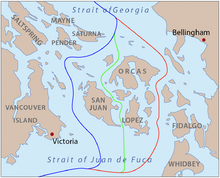 Proposed boundaries: Through Haro Strait, favored by the US Through Rosario Strait, favored by Britain Through San Juan Channel, compromise proposal The lines are as shown on maps of the time. The modern boundary follows straight line segments and roughly follows the blue line. The modern eastern boundary of San Juan County roughly follows the red line. |
Inconclusive/Other Result
| |||
| John Brown's Raid on Harpers Ferry (1859) Part of pre-Civil War conflicts Location: West Virginia  |
Abolitionist Insurgents | US victory | ||
| First and Second Cortina War (1859–1861) Location: Texas and Mexico |
US-allied victory | |||
| Paiute War (1860) Part of the American Indian Wars Location: Pyramid Lake, Nevada |
Paiute Shoshone Bannock |
US victory | ||
| American Civil War (1861–1865) Location: Southern United States, Indian Territory, Northeastern United States, Western United States, Atlantic Ocean  |
Indian Home Guard Seminole Nation (Western) (most)[16] Seminole Nation (Florida) Muskogee Nation (part)[17] |
Cherokee Nation Choctaw Nation Catawba Chickasaw Nation (part) Muskogee Nation (part) Seminole Nation (Western) (part) Comanche Nation (part) |
US victory
|
|
| Bombardment of Qui Nhơn
(1861) Part of the Cochinchina Campaign Location: Qui Nhơn, Vietnam |
US Victory
| |||
| Yavapai Wars (1861–1875) Part of the American Indian Wars Location: Arizona  |
Yavapai Apache Yuma Mohave |
US victory |
Abraham Lincoln (March 4, 1861 – April 15, 1865) Andrew Johnson (April 15, 1865 – March 4, 1869) Ulysses S. Grant (March 4, 1869 – March 4, 1877) | |
| Dakota War of 1862 (1862) Part of the American Indian Wars Location: Minnesota and Dakota  |
Dakota Sioux | US victory | Abraham Lincoln | |
| 1st Battle of Shimonoseki Straits and the following Shimonoseki campaign (1863-1864) Part of Bakumatsu Conflicts  |
US-allied victory
| |||
| Colorado War (1863–1865) Part of the American Indian Wars Location: Colorado, Wyoming, and Nebraska |
Cheyenne Arapaho Sioux |
Inconclusive/Other Result
| ||
| Snake War (1864–1868) Part of the American Indian Wars Locations: Oregon, Nevada, California, and Idaho |
Paiute Bannock Shoshone |
US victory | Abraham Lincoln (March 4, 1861 – April 15, 1865)
Andrew Johnson (April 15, 1865 – March 4, 1869) | |
| Powder River War (1865) Part of the American Indian Wars Location: Powder River State |
Sioux Cheyenne Arapaho |
Inconclusive | ||
| Red Cloud's War (1866–1868) Part of the American Indian Wars Location: Powder River State  |
Crow Nation |
Lakota Cheyenne Arapaho |
Lakota-allied victory
| |
| Formosa Expedition (1867) Location: Hengchun, Taiwan, Qing China'  |
Paiwan | Paiwan victory | ||
| Comanche Campaign (1867–1875) Part of the American Indian Wars Location: Western United States  |
Cheyenne Arapaho Comanche Kiowa |
US victory | Andrew Johnson (April 15, 1865 – March 4, 1869)
Ulysses S. Grant (March 4, 1869 – March 4, 1877) | |
| United States expedition to Korea (1871) Location: Ganghwa Island  |
Inconclusive/Other Result
American military victory American diplomatic failure
|
Ulysses S. Grant | ||
| Modoc War (1872–1873) Part of the American Indian Wars Location: California and Oregon  |
Modoc | US victory | ||
| Red River War (1874–1875) Part of the American Indian Wars Location: Texas |
Cheyenne Arapaho Comanche Kiowa |
US victory
| ||
| Las Cuevas War (1875) Location: Texas and Mexico 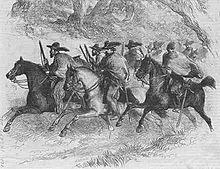 |
Mexican bandits | US victory
| ||
| Great Sioux War of 1876 (1876–1877) Part of the American Indian Wars Location: Montana, Dakota and Wyoming  |
Lakota Dakota Sioux Northern Cheyenne Arapaho |
US victory
| ||
| Buffalo Hunters' War (1876–1877) Part of the American Indian Wars Location: Texas and Oklahoma |
Comanche Apache |
US victory | ||
| Nez Perce War (1877) Part of the American Indian Wars Location: Oregon, Idaho, Wyoming, and Montana  |
Nez Perce Palouse |
US victory | Rutherford B. Hayes | |
| Bannock War (1878) Part of the American Indian Wars Location: Idaho, Oregon, and Wyoming |
Bannock Shoshone Paiute |
US victory | ||
| Cheyenne War (1878–1879) Part of the American Indian Wars Location: Oklahoma, Kansas, Nebraska, South Dakota and Montana  |
Cheyenne | US victory | ||
| Sheepeater Indian War (1879) Part of the American Indian Wars Location: Idaho |
Shoshone | US victory | ||
| Victorio's War (1879–1880) Part of the American Indian Wars Location: Mexico |
Apache | US-allied victory | ||
| White River War (1879) Part of the American Indian Wars Location: Colorado  |
Ute | US victory | ||
| Egyptian Expedition (1882) Part of the Anglo-Egyptian War Location: Alexandria  |
US victory | Chester A. Arthur | ||
| Crow War (1887) Part of the American Indian Wars Location: Montana  |
Crow people | US victory | Grover Cleveland | |
| Ghost Dance War (1890–1891) Part of the American Indian Wars Location: South Dakota  |
Sioux | US victory | Benjamin Harrison | |
| Garza War (1891–1893) Location: Texas and Mexico  |
Garzistas | US-allied victory | ||
| Yaqui Wars (1896–1918) Part of the American Indian Wars Location: Arizona and Mexico  |
Yaqui Pima Opata |
US-allied victory | Grover Cleveland (March 4, 1893 – March 4, 1897)
| |
| Second Samoan Civil War (1898–1899) Location: Samoa  |
Samoa |
Mataafans |
Inconclusive/Other Result
|
William McKinley |
| Spanish–American War (1898) Location: Cuba, Puerto Rico, Philippines and Guam 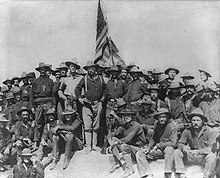 |
US-allied victory
| |||
| Philippine–American War (1899–1902) Location: Philippines  |
1899–1902 1902-1906 |
1899–1902 Limited Foreign Support: 1902-1906 |
US victory
|
William McKinley (March 4, 1897 – September 14, 1901)
|
| Moro Rebellion (1899–1913) Location: Philippines 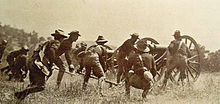 |
US victory
|
William McKinley (March 4, 1897 – September 14, 1901)
| ||
| Boxer Rebellion (1899–1901) Location: China  |
|
US-allied victory
|
William McKinley |
20th-century wars
| Conflict | Allies | Opponent(s) | Result for the United States and its Allies | Presidents of the United States |
|---|---|---|---|---|
| Crazy Snake's War (1909) Part of the American Indian Wars Location: Oklahoma  |
Creek | US victory | Theodore Roosevelt (September 14, 1901 – March 4, 1909) Warren G. Harding Calvin Coolidge | |
| Mexican Border War (1910–1919) Part of the Mexican Revolution Location: Mexico–United States border  |
Supported by: |
US victory
|
William Howard Taft (March 4, 1909 – March 4, 1913) Woodrow Wilson | |
| Little Race War (1912) Part of the Banana Wars Location: Cuba  |
US-allied victory
|
William Howard Taft | ||
| United States occupation of Nicaragua (1912–1933) Part of the Banana Wars Location: Nicaragua 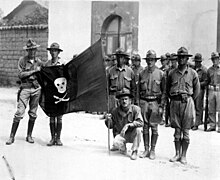 |
US victory
|
William Howard Taft (March 4, 1909 – March 4, 1913) Woodrow Wilson Warren G. Harding Calvin Coolidge Herbert Hoover | ||
| Bluff War (1914–1915) Part of the American Indian Wars Location: Utah and Colorado  |
Ute Paiute |
US victory | Woodrow Wilson | |
| United States occupation of Veracruz (1914) Part of the Mexican Revolution Location: Mexico  |
Supported by: |
Supported by: |
US victory | |
| United States occupation of Haiti (1915–1934) Part of the Banana Wars Location: Haiti 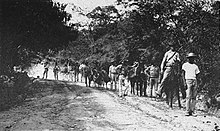 |
US-allied victory | Woodrow Wilson (March 4, 1913 – March 4, 1921) Warren G. Harding Calvin Coolidge Herbert Hoover Franklin D. Roosevelt | ||
| United States occupation of the Dominican Republic (1916–1924) Part of the Banana Wars Location: Dominican Republic 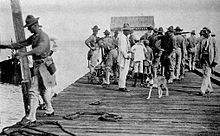 |
US victory | Woodrow Wilson (March 4, 1913 – March 4, 1921) Warren G. Harding Calvin Coolidge | ||
| World War I (1914–1918, direct U.S. involvement in 1917–1918) Location: Europe, Africa, Asia, Middle East, the Pacific Islands, and coast of North and South America  |
|
US-allied victory
|
Woodrow Wilson | |
| Russian Civil War (1917–1923, direct U.S. involvement in 1918–1920, [American Expeditionary Force, North Russia and American Expeditionary Force, Siberia])
 |
|
|
Bolshevik victory[19]
| |
| Posey War (1923) Part of the American Indian Wars Location: Utah  |
Ute Paiute |
US victory
|
Warren G. Harding | |
| World War II (1939–1945, direct U.S. involvement in 1941–1945) Location: Europe, Pacific Ocean, Atlantic Ocean, Southeast Asia, East Asia, Middle East, Mediterranean, North Africa, Oceania, North and South America  |
Allies:
|
Axis:
|
US-allied victory
|
Franklin D. Roosevelt Harry S. Truman |
| Operation Beleaguer (1945-1949) Part of the Chinese Civil War and the Cold War  |
Inconclusive/Other Result
|
Harry S. Truman | ||
| Puerto Rican Nationalist Party insurgency (1950-1954) Part of political violence in the United States during the Cold War |
United States victory
|
Harry S. Truman | ||
| Korean War (1950–1953) Part of the Cold War Location: Korea  |
|
|
Inconclusive/Other Result
|
Harry S. Truman (April 12, 1945 – January 20, 1953) Dwight D. Eisenhower |
| Vietnam War (1955–1964[a], 1965–1973[b], 1974–1975[c]) Part of the Cold War and Indochina Wars Location: Vietnam, Cambodia, and Laos  |
Supported by: |
North Vietnam-allied victory
|
Dwight D. Eisenhower (January 20, 1953 – January 20, 1961) John F. Kennedy Lyndon B. Johnson Richard Nixon Gerald Ford | |
| Laotian Civil War (1959–1975) Part of the Indochina Wars and Cold War Location: Laos  |
Supported by: |
Supported by: |
Pathet Lao-allied victory
| |
| Permesta Rebellion (1958–1961) Location: Indonesia  |
Indonesian government victory | Dwight D. Eisenhower | ||
| Lebanon crisis (1958) Location: Lebanon  |
US-allied victory
| |||
| Bay of Pigs Invasion (1961) Part of the Cold War Location: Cuba  |
Cuban government victory
|
John F. Kennedy | ||
| Operation Dragon Rouge (1964) Part of the Simba Rebellion during the Congo Crisis and the Decolonization of Africa during the Cold War Location: Stanleyville, Congo-Léopoldville  |
Supported by: |
US-allied victory
|
Lyndon B. Johnson | |
| Dominican Civil War (1965–1966) Location: Dominican Republic  |
US-allied victory
|
Lyndon B. Johnson | ||
| Korean DMZ Conflict (1966–1969) Part of the Korean conflict and the Cold War Location: Korean Demilitarized Zone  |
US-allied victory
|
Lyndon B. Johnson (November 22, 1963 – January 20, 1969) Richard Nixon | ||
| Cambodian Civil War (1967–1975) Part of the Cold War Location: Cambodia  |
Supported by: |
Supported by: |
Khmer Rouge-allied victory
|
Lyndon B. Johnson (November 22, 1963 – January 20, 1969) Richard Nixon Gerald Ford |
| Multinational intervention in Lebanon (1982–1984) Location: Lebanon  |
Multinational Force in Lebanon: |
|
Syrian-allied victory
|
Ronald Reagan (January 20, 1981 – January 20, 1989) |
| United States invasion of Grenada (1983) Part of the Cold War Location: Grenada  |
Military advisors: |
US-allied victory
|
Ronald Reagan | |
| Bombing of Libya (1986) Location: Libya  |
Inconclusive
| |||
| Tanker War (1987–1988) Part of the Iran–Iraq War Location: Persian Gulf  |
US victory
| |||
| United States invasion of Panama (1989–1990) Location: Panama  |
US-allied victory
|
George H. W. Bush | ||
| Gulf War (1990–1991) Location: Iraq, Kuwait, Saudi Arabia, and Israel 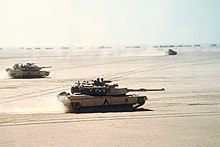 |
US-allied victory
| |||
| Iraqi No-Fly Zone Enforcement Operations (1991–2003) Location: Iraq  |
US-allied victory
|
George H. W. Bush (January 20, 1989 – January 20, 1993) Bill Clinton George W. Bush | ||
| First U.S. Intervention in the Somali Civil War (1992–1995) Part of the Somali civil war (1991–present) Location: Somalia 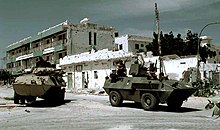 |
Somali victory
|
George H. W. Bush (January 20, 1989 – January 20, 1993) Bill Clinton | ||
| Bosnian War and Croatian War (1992–1995) Part of the Yugoslav Wars Location: Bosnia and Herzegovina and Croatia  |
|
Inconclusive/Other Result
| ||
| Intervention in Haiti (1994–1995) Location: Haiti  |
US-allied victory
|
Bill Clinton | ||
| Kosovo War (1998–1999) Part of the Yugoslav Wars Location: Serbia 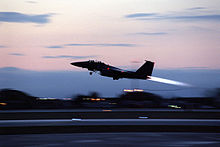 |
Inconclusive/Other Result
|
- ^ Advisory role from the forming of the MAAG in Vietnam to the Gulf of Tonkin incident.
- ^ Direct U.S. involvement ended in 1973 with the Paris Peace Accords. The Paris Peace Accords of January 1973 saw all U.S forces withdrawn; the Case–Church Amendment, passed by the U.S Congress on August 15, 1973, officially ended direct U.S military involvement .
- ^ The war reignited on December 13, 1974, with offensive operations by North Vietnam, leading to victory over South Vietnam in under five months.
21st-century wars
| Conflict | Allies | Belligerent | Result for the United States and its Allies | Presidents of the United States |
|---|---|---|---|---|
| War in Afghanistan (2001–2021) Part of the war on terror and the Afghan conflict Location: Afghanistan  |
Formerly: |
Allied groups
Taliban splinter groups 2001 Invasion: |
Afghan Taliban victory
|
George W. Bush (October 7, 2001 – January 20, 2009) Barack Obama Donald Trump Joe Biden |
| US intervention in Yemen (2002–present) Part of the war on terror, the al-Qaeda insurgency in Yemen, the Yemeni Civil War and the Saudi-led intervention in the Yemeni civil war Location: Yemen  |
Saudi-led coalition: In support of: |
|
Ongoing
US Intervention against jihadists
US Intervention against Houthi movement
|
George W. Bush (October 7, 2001 – January 20, 2009) Barack Obama Donald Trump Joe Biden Donald Trump |
| Iraq War (2003–2011) Part of the war on terror Location: Iraq  |
Post-invasion (2003–2011)
List
Invasion phase (2003) |
Post-invasion (2003–2011) Invasion phase (2003) Dulaim Tribes |
Inconclusive/Other Result
|
George W. Bush (January 20, 2001 – January 20, 2009) Barack Obama |
| US intervention in the War in North-West Pakistan (2004–2018) Part of the war on terror and the War in North-West Pakistan Location: Pakistan  |
Supported by: |
Jihadists:
|
US-allied victory
|
George W. Bush (January 20, 2001 – January 20, 2009) Barack Obama Donald Trump |
| Second US Intervention in the Somali Civil War (2007–present) Part of the Somali Civil War, the Somali Civil War and the war on terror Location: Somalia and Northeastern Kenya  |
Supported by: Non-combat support: |
Jihadists:
|
Ongoing
|
George W. Bush (January 20, 2001 – January 20, 2009) Barack Obama Donald Trump Joe Biden Donald Trump |
| Operation Ocean Shield (2009–2016) Location: Indian Ocean  |
|
Somali pirates | US-allied victory
|
Barack Obama (January 20, 2009 – January 20, 2017) |
| International intervention in Libya (2011) Part of the Libyan Crisis and the First Libyan Civil War Location: Libya  |
|
|
US-allied victory
|
Barack Obama (January 20, 2009 – January 20, 2017) |
| Operation Observant Compass (2011–2017) Part of the war on terror and the Lord's Resistance Army insurgency Location: Uganda  |
US-allied victory
|
Barack Obama (January 20, 2009 – January 20, 2017) Donald Trump | ||
| US military intervention in Niger (2013–2024) Part of the war on terror, the Operation Juniper Shield and the Jihadist insurgency in Niger Location: Niger  |
Supported by: |
Jihadists:
|
Niger Junta Victory[66][67][68][69]
|
Barack Obama (January 20, 2009 – January 20, 2017) Donald Trump Joe Biden |
| US-led intervention in Iraq (2014–2021) Part of the Operation Inherent Resolve, the War in Iraq (2013–2017), the Spillover of the Syrian civil war, the war on terror and the International ISIS campaign Location: Iraq  |
|
Jihadists: | US-allied victory
|
Barack Obama (January 20, 2009 – January 20, 2017) Donald Trump Joe Biden |
| US intervention in the Syrian civil war (2014–present) Part of the Operation Inherent Resolve, the Syrian civil war, the war on terror, the international ISIS campaign, and the spillover of the Israel–Hamas war in Syria Location: Syria  |
|
|
Ongoing
US Intervention against jihadists
US Intervention against Assad government
|
Barack Obama (January 20, 2009 – January 20, 2017) Donald Trump Joe Biden Donald Trump |
| US intervention in Libya (2015–2019) Part of the Operation Inherent Resolve, the war on terror, the Second Libyan Civil War, and the International ISIS Campaign Location: Libya 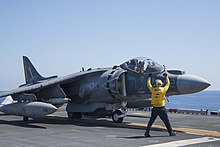 |
Jihadists:
|
ISIS in Libya largely defeated
|
Barack Obama (January 20, 2009 – January 20, 2017) Donald Trump | |
| Operation Prosperity Guardian (2023–present) Part of the Red Sea crisis, the Israel–Hamas war and the Yemeni Civil War Location: Red Sea, Gulf of Aden and Yemen 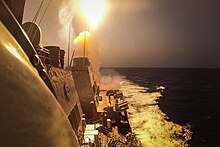 |
Supported by:
|
Ongoing
|
Joe Biden (January 20, 2021 – January 20, 2025) Donald Trump | |
| Israel–Hamas war (2024–present) Part of the Arab–Israeli(Palestinian(Gaza))conflicts, Spillover of the Syrian civil war, and the Middle Eastern crisis (2023–present) Main Location: Israel and Gaza Peripheral Location: West Bank, Syria, Lebanon, Egypt, and Iran |
Palestinian Joint Operations Room:
Supported by: |
Ongoing | Joe Biden (January 20, 2021 – January 20, 2025) Donald Trump |
See also
- List of notable deployments of U.S. military forces overseas
- Timeline of United States military operations
- Military history of the United States
- United States Armed Forces
- List of American military installations
- List of United States drone bases
- Social history of soldiers and veterans in the United States
Notes
- ^ Some historians name the 1861–1865 war the "Second American Civil War", because in their view, the American Revolutionary War can also be considered a civil war (since the term can be used in reference to any war in which one political body separates itself from another political body). They then refer to the Independence War, which resulted in the separation of the Thirteen Colonies from the British Empire, as the "First American Civil War".[1][2] A significant number of American colonists stayed loyal to the British Crown and as Loyalists fought on the British side while opposite were a significant amount of colonists called Patriots who fought on the American side. In some localities, there was fierce fighting between Americans including gruesome instances of hanging, drawing, and quartering on both sides.[3][4][5][6]
- As early as 1789, David Ramsay, an American patriot historian, wrote in his History of the American Revolution that "Many circumstances concurred to make the American war particularly calamitous. It was originally a civil war in the estimation of both parties."[7] Framing the American Revolutionary War as a civil war is gaining increasing examination.[8][9][10][1]. You can read part two of his 1789 book in full here
- A group of Bristol, England merchants wrote to King George III in 1775 voicing their “most anxious apprehensions for ourselves and Posterity that we behold the growing distractions in America threaten” and ask for their majesty’s “Wisdom and Goodness” to save them from “a lasting and ruinous Civil War.”[2]. You can read the 1775 petition in full here
- The “constrained voice” is a good synopsis of how the British viewed the American Revolutionary War. From anxiety to a foreboding sense of the conflict being a civil war,[3]
- In the early stages of the rebellion by the American colonists, most of them still saw themselves as English subjects who were being denied their rights as such. “Taxation without representation is tyranny,” James Otis reportedly said in protest of the lack of colonial representation in Parliament. What made the American Revolution look most like a civil war, though, was the reality that about one-third of the colonists, known as loyalists (or Tories), continued to support and fought on the side of the crown.[4]
- ^ France entered the American Revolution on the side of the colonists in 1778, turning what had essentially been a civil war into an international conflict.[5]
- The Revolution was both an international conflict, with Britain and France vying on land and sea, and a civil war among the colonists, causing over 60,000 loyalists to flee their homes.[6]
- Until early in 1778 the conflict was a civil war within the British Empire, but afterward it became an international war as France (in 1778) and Spain (in 1779) joined the colonies against Britain. Meanwhile, the Netherlands, which provided both official recognition of the United States and financial support for it, was engaged in its own war against Britain.[7]
- ^ Three months after the military defeat of the RSK in Operation Storm,[23] the UN-sponsored Erdut Agreement between the Croatian and RSK authorities was signed on 12 November 1995.[24] The agreement provided for a two-year transitional period, later extended by a year, during which the remaining occupied territory of Croatia was to be transferred to control of the Croatian government. The agreement was implemented by UNTAES and successfully completed by 1998.[25]
References
- ^ Eric Herschthal. America's First Civil War: Alan Taylor's new history poses the revolution as a battle inside America as well as for its liberty Archived June 26, 2017, at the Wayback Machine, The Slate, September 6, 2016.
- ^ James McAuley. Ask an Academic: Talking About a Revolution Archived January 7, 2018, at the Wayback Machine, The New Yorker, August 4, 2011.
- ^ Thomas Allen. Tories: Fighting for the King in America's First Civil War. New York, Harper, 2011.
- ^ Peter J. Albert (ed.). An Uncivil War: The Southern Backcountry During the American Revolution. Charlottesville: University of Virginia Press, 1985.
- ^ Alfred Young (ed.). The American Revolution: Explorations in the History of American Radicalism. DeKalb: Northern Illinois University Press, 1976.
- ^ Armitage, David. Every Great Revolution Is a Civil War Archived December 3, 2013, at the Wayback Machine. In: Keith Michael Baker and Dan Edelstein (eds.). Scripting Revolution: A Historical Approach to the Comparative Study of Revolutions. Stanford: Stanford University Press, 2015. According to Armitage, "The renaming can happen relatively quickly: for example, the transatlantic conflict of the 1770s that many contemporaries[who?] saw as a British "civil war" or even "the American Civil War" was first called "the American Revolution" in 1776 by the chief justice of South Carolina, William Henry Drayton."
- ^ David Ramsay. The History of the American Revolution Archived July 27, 2018, at the Wayback Machine. 1789.
- ^ Elise Stevens Wilson. Colonists Divided: A Revolution and a Civil War Archived October 17, 2016, at the Wayback Machine, The Gilder Lehrman Institute of American History.
- ^ Timothy H. Breen. The American Revolution as Civil War Archived June 24, 2017, at the Wayback Machine, National Humanities Center.
- ^ 1776: American Revolution or British Civil War? Archived July 27, 2018, at the Wayback Machine, University of Cambridge.
- ^ "Milestones: 1801–1829". Office of the Historian, State Department, United States.
- ^ David Hunter Miller, ed. (1931). Treaties and Other International Acts of the United States of America. Vol. 2. U.S. Government Printing Office. pp. 275, 303.
- ^ a b c d e f "Tripolitan War | Encyclopedia.com". www.encyclopedia.com. Retrieved May 8, 2019.
- ^ a b r2WPadmin. "First Barbary War". American History Central. Retrieved May 8, 2019.
{{cite web}}: CS1 maint: numeric names: authors list (link) - ^ Serial 89, 18th Congress, 1st Session, Senate Document No. 1, p. 95
- ^ "The Indians". The Philadelphia Inquirer. November 12, 1884.
- ^ "Union and Confederate Indians in the Civil War". civilwarhome.com. February 16, 2002. Archived from the original on February 13, 2021. Retrieved December 12, 2021.
- ^ "City of Albuquerque". City of Albuquerque.
- ^ Kenez, Peter (1977). Civil War in South Russia, 1919–1920: The Defeat of the Whites. Hoover Institution on War, Revolution, and Peace. p. 182. ISBN 978-0520033467.
- ^ "Statement by Deputy Press Secretary Larry Speakes". September 23, 1982.
- ^ Brinkley, Joel (March 11, 1984). "The Collapse of Lebanon's Army: U.S. Said to Ignore Factionalism". The New York Times.
- ^ Martel, William C. Victory in War: Foundations of Modern Military Policy, p. 162. Cambridge: Cambridge University Press, 2011.
- ^ Dean E. Murphy (August 8, 1995). "Croats Declare Victory, End Blitz". Los Angeles Times. Archived from the original on October 12, 2012. Retrieved December 18, 2010.
- ^ Chris Hedges (November 12, 1995). "Serbs in Croatia Resolve Key Issue by Giving up Land". The New York Times. Archived from the original on May 18, 2013. Retrieved December 18, 2010.
- ^ Chris Hedges (January 16, 1998). "An Ethnic Morass Is Returned to Croatia". The New York Times. Archived from the original on May 18, 2013. Retrieved December 18, 2010.
- ^ McEldowney, Nancy (2000). "Kosovo: Redefining Victory in an Era of Limited War" (PDF). Defense Technical Information Center.
- ^ Cambridge Scholars Publisher (2015). Coercive Diplomacy of NATO in Kosovo. Cambridge Scholars Publishing. pp. 289–. ISBN 978-1-4438-7668-1.
- ^ Erlanger, Steven (November 7, 1999). "NATO Was Closer to Ground War in Kosovo Than Is Widely Realized". The New York Times.
- ^ Lake, Daniel R. (2009). "The Limits of Coercive Airpower: NATO's "Victory" in Kosovo Revisited". International Security. 34: 83–112. doi:10.1162/isec.2009.34.1.83. S2CID 57572298.
- ^ "Central Asian groups split over leadership of global jihad". The Long War Journal. August 24, 2015. Retrieved August 27, 2015.
- ^ "U.S. Troops in Afghanistan now down to 2,500, lowest since 2001: Pentagon". Reuters. January 15, 2021.
- ^ "Remarks by President Biden on Afghanistan". The White House. August 16, 2021.
- ^ Gibbons-Neff, Thomas; Katzenberg, Lauren (August 30, 2021). "The U.S. military finishes its evacuation, and an era ends in Afghanistan". The New York Times. ISSN 0362-4331. Retrieved August 30, 2021.
- ^ Lou, Mary (January 1, 2022). "Taliban a 'major U.S. arms dealer' after weaponry left behind in Afghanistan, watchdog warns". Just The News. Retrieved August 15, 2022.
- ^ "The War in Yemen". newamerica.org. August 14, 2023. Retrieved August 14, 2023.
- ^ "Yemen Leaders Killed". Washington, DC, USA: New America. Retrieved April 20, 2018.
- ^ "US drone strike kills 2 suspected Al-Qaeda militants in Yemen's Marib". arabnews.com. Retrieved May 9, 2023.
- ^ Gatehouse, Gabriel (September 11, 2015). "Inside Yemen's forgotten war". BBC News. Archived from the original on October 29, 2015.
- ^ "US special forces secretly deployed to assist Saudi Arabia in Yemen conflict". The Independent. Retrieved May 9, 2023.
- ^ "Sectarian divisions change Baghdad's image". NBC News. July 3, 2006. Retrieved February 18, 2007.
- ^ Petrou, Michael (September 9, 2011). "The decline of al-Qaeda". Maclean's.
George W. Bush gambled on surging thousands more troops to the embattled country. It paid off. Al-Qaeda in Iraq is now a diminished force without territory.
- ^ Spencer C. Tucker (December 14, 2015). U.S. Conflicts in the 21st Century: Afghanistan War, Iraq War, and the War on Terror. Bloomsbury Publishing USA. ISBN 978-1-4408-3879-8.
Al Qaeda in Iraq was decimated by the end of the Iraq War in 2011
- ^ South, Todd (January 20, 2019). "Army's long-awaited Iraq war study finds Iran was the only winner in a conflict that holds many lessons for future wars". Army Times. Retrieved January 20, 2019.
- ^ Galbraith, Peter W. (2007). The End of Iraq: How American Incompetence Created a War Without End. Simon & Schuster. p. 74. ISBN 978-0-7432-9424-9.
- ^ "Iran expands regional 'empire' ahead of nuclear deal". Reuters. March 23, 2015.
- ^ "How to Stop Iran's Growing Hegemony". National Review Online. April 10, 2015.
- ^ "The JRTN Movement and Iraq's Next Insurgency | Combating Terrorism Center at West Point". Ctc.usma.edu. Archived from the original on August 26, 2011. Retrieved August 2, 2014.
- ^ "Al-Qaeda's Resurgence in Iraq: A Threat to U.S. Interests". U.S. Department of State. February 5, 2014. Retrieved November 26, 2010.
- ^ "Drone War: Pakistan". The Bureau of Investigative Journalism. Retrieved April 20, 2018.
- ^ "Pakistan Leaders Killed" Archived September 18, 2017, at the Wayback Machine. New America Foundation. June 23, 2018
- ^ "US Drone Kills Afghan-Based Pakistani Taliban Commander". Voice of America (VOA). July 4, 2018.
- ^ "CIA drone strikes in Pakistan, 2004 to present". Bureau of Investigative Journalism. January 24, 2018. Archived from the original on March 5, 2017. Retrieved March 15, 2019.
- ^ Somalia, EUTM. "Home". EUTM-Somalia. Retrieved April 18, 2019.
- ^ a b c "Service and Sacrifice: Ugandan 'Blue Helmets' support UN efforts to bring peace to Somalia". UN News. April 18, 2019. Retrieved April 18, 2019.
- ^ "Biden approves deployment of hundreds of US troops to Somalia". aljazeera.com. June 4, 2022.
- ^ "New Somali President Welcomes Return of US Troops". voanews.com. June 4, 2022.
- ^ "Bilal al-Sudani: US forces kill Islamic State Somalia leader in cave complex". BBC News. January 27, 2023. Retrieved February 1, 2023.
- ^ "US increases military support for Somalia against al-Shabab". Defense News. Defense News. March 1, 2023. Retrieved March 1, 2023.
- ^ "Federal Government of Somalia, AFRICOM target al-Shabaab". United States Africa Command. May 25, 2024. Retrieved May 25, 2024.
- ^ "Somali piracy is down 90 per cent from last year". The Journal. December 15, 2013. Retrieved January 14, 2014.
- ^ Blomfield, Adrian (February 23, 2011). "Libya: Foreign Mercenaries Terrorising Citizens". The Daily Telegraph. Archived from the original on March 10, 2011. Retrieved March 22, 2011.
- ^ HUMA KHAN; HELEN ZHANG (February 22, 2011). "Moammar Gadhafi's Private Mercenary Army 'Knows One Thing: To Kill'". ABC News. Archived from the original on April 8, 2011. Retrieved March 22, 2011.
- ^ Meo, Nick (February 27, 2011). "African Mercenaries in Libya Nervously Await Their Fate". The Daily Telegraph. Archived from the original on March 15, 2011. Retrieved March 22, 2011.
- ^ Holmes, Oliver (January 24, 2012). "UPDATE 1-Anger, chaos but no revolt after Libya violence". Bani Walid. Reuters Africa. Archived from the original on April 30, 2012. Retrieved January 24, 2012.
- ^ "The rise of the 'Madkhalists': Inside Libya's struggle for religious supremacy". Middle East Eye. Retrieved August 23, 2023.
- ^ "America has lost the war against Islamist terror in Africa". The Spectator. May 3, 2024.
- ^ "After Failure in Niger, U.S. Africa Policy Needs a Reset". Foreign Policy. July 3, 2024.
- ^ "The US War on Terror in West Africa Is a Continuing Disaster". Jacobin. July 3, 2024.
- ^ "America's $280 Million Military Mission in Niger Ends in Failure". Reason. July 3, 2024.
- ^ "Niger ends military agreement with US, calls it 'profoundly unfair'". CNN. CNN. April 12, 2024. Retrieved April 12, 2024.
- ^ "Niger's Military Junta Ditches America and Courts Russia". Bloomberg. Bloomberg. March 19, 2024. Retrieved May 2, 2024.
- ^ "Russian military trainers arrive in Niger as African country pulls away from US". The Guardian. The Guardian. April 12, 2024. Retrieved April 12, 2024.
- ^ "Niger attack: Jihadists kill dozen of soldiers in deadliest raid since coup". BBC. May 1, 2024.
- ^ "Niger: 7 soldiers killed in a suspected jihadists attack". Africanews. May 1, 2024.
- ^ "Niger: 17 troops killed in suspected jihadist attack". Le Monde. May 1, 2024.
- ^ "Armed men ambush Niger soldiers, causing dozens of casualties". TRT World. May 1, 2024.
- ^ "Baghdad declares victory over ISIS". NBC News. February 5, 2018. Retrieved March 3, 2019.
- ^ "IS left 200 mass graves in Iraq - UN". November 6, 2018. Retrieved June 21, 2019.
- ^ Arraf, Jane (December 9, 2021). "U.S. Announces End to Combat Mission in Iraq, but Troops Will Not Leave". The New York Times. Archived from the original on December 28, 2021.
- ^ "US-led combat mission in Iraq ends, shifting to advisory role". aljazeera.com.
- ^ "U.S.-led troops end Iraq combat mission, as planned - military officials". reuters.com. December 9, 2021.
- ^ "Trump claims U.S. has defeated ISIS in Syria". Reuters. December 18, 2018.
- ^ "The Return of ISIS in Iraq, Syria, and the Middle East". Center for Strategic and International Studies. September 3, 2019.
- ^ "ISIL confirms death of leader Abu Hussein al-Qurashi, names successor". www.aljazeera.com. Retrieved August 27, 2023.
- ^ "Islamic State confirms death of its leader, names replacement". Reuters. August 3, 2023. Retrieved August 27, 2023.
- ^ Carl, Nicholas; Jhaveri, Ashka; Braverman, Alexandra (January 28, 2024). "Iran Update, January 28, 2024" (Think tank analysis). Washington, D.C.: Institute for the Study of War. Retrieved January 29, 2024.
These militias have conducted over 170 attacks targeting US positions as part of this effort since October 2023.
- ^ "Pentagon says it doubled the number of US troops in Syria before Assad's fall". Associated Press. December 19, 2024. Retrieved December 20, 2024.
- ^ "Austin announces US-led security operation focusing on Red Sea, Gulf of Aden after Houthi attacks on commercial shipping". CNN. CNN. December 19, 2023. Retrieved December 19, 2023.
- ^ "US-led coalition of 10 nations to counter Houthi attacks on vessels in Red Sea". The Times of Israel. The Times of Israel. December 19, 2023. Retrieved December 19, 2023.
- ^ "Navy faces most intense running sea battle since WWII with Houthis". Navy Times. June 16, 2024. Retrieved September 7, 2024.
- ^ "US troops arrive in Israel". Telegraph. October 15, 2024. Retrieved October 18, 2024.
Around 100 American military personnel in total will be sent to operate the system – the first time US troops have been deployed in combat in Israel during the current crisis.
- ^ Cooper, Helene (October 13, 2024). "U.S. to Deploy Missile Defense System and About 100 Troops to Israel". The New York Times. Retrieved October 18, 2024.
External links
- Heidelberg Institute for International Conflict Research (HIIK)
- Conflict Barometer – Describes recent trends in conflict development, escalations, and settlements
- A Continent Divided: The U.S.-Mexico War[permanent dead link], Center for Greater Southwestern Studies, the University of Texas at Arlington
- Timeline of wars involving the United States, Histropedia
- U.S. Periods of War and Dates of Recent Conflicts, Congressional Research Service
